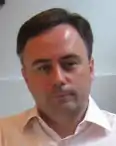John Graham-Cumming
John Graham-Cumming is a British software engineer and writer[4][5] best known for starting a successful petition to the Government of the United Kingdom asking for an apology for its persecution of Alan Turing.[6] As of 2020, he serves as Chief Technology Officer (CTO) at Cloudflare,[7][8][9] previously he worked at Electric Cloud.[3]
John Graham-Cumming | |
|---|---|
 John Graham-Cumming in 2010 | |
| Alma mater | University of Oxford (DPhil) |
| Known for | POPFile The Geek Atlas[1] |
| Scientific career | |
| Institutions | Cloudflare[2] Electric Cloud[3] |
| Thesis | The formal development of secure systems (1992) |
| Doctoral advisor | Jeff W. Sanders |
| Website | www |
Education
Graham-Cumming was educated at the University of Oxford where he was awarded a Doctor of Philosophy degree in Computer Science in 1992 for research on communicating sequential processes (CSPs) supervised by Jeff W. Sanders.[10] He was a postgraduate student at Lady Margaret Hall, Oxford.[10]
Career
Graham-Cumming is the original writer of POPFile, an open-source, cross-platform email spam filtering program.[11] He is the author of The Geek Atlas, a travel book,[1] and The GNU Make book, a how-to technical manual for the GNU make software.[12]
In October 2010, he started an organization whose aim is to build Charles Babbage's Analytical Engine,[13][14][15][16] known as Plan 28.[17] He has also campaigned for open-source software in science.[18] In 2014, he launched his MovieCode site on Tumblr, which aims to connect film screenshots to specific extracts of source code.[19]
References
- John Graham-Cumming (2009). The Geek Atlas: 128 Places Where Science and Technology Come Alive. Sebastopol, CA: O'Reilly Media, Inc. ISBN 978-0-596-52320-6. OCLC 850983602.
- Swan, Chris (2014). "John Graham-Cumming on Polyglot Programming and Geek History". infoq.com. C4Media Inc. Retrieved 17 May 2016.
- Melski, Eric (2009). "Seven lessons from seven years at Electric Cloud". electric-cloud.com. Archived from the original on 25 February 2020.
- John Graham-Cumming on Twitter

- Anon (2010). "John Graham-Cumming Profile". theguardian.com. London: The Guardian. Retrieved 3 October 2013.
- Whiteman, Hilary (2009). "Petition seeks apology for Enigma code-breaker Turing". edition.cnn.com. CNN. Retrieved 3 October 2013.
- Graham-Cumming, John (2019). "Helping To Build Cloudflare, Part 1: How I came to work here". blog.cloudflare.com. Cloudflare.
- Scammell, Robert (2020). "CTO Talk: Q&A with Cloudflare's John Graham-Cumming". verdict.co.uk.
- Graham-Cumming, John (2019). "Helping To Build Cloudflare, Part 2: The Most Difficult Two Weeks". blog.cloudflare.com. Cloudflare.
- Graham-Cumming, John (1992). The formal development of secure systems. ox.ac.uk (DPhi thesis). University of Oxford. OCLC 60063995. EThOS uk.bl.ethos.315747.
- Schechter, Bruce (8 March 2003). "Spambusters". newscientist.com. New Scientist. Retrieved 3 November 2013.
- Graham-Cumming, John (2008). The GNU Make Book. No Starch Press. ISBN 9781593276492. OCLC 896860365.
- Fildes, Jonathan (2010). "Campaign builds to construct Babbage Analytical Engine". bbc.co.uk. BBC News. Retrieved 3 October 2013.
- Graham, Duncan (3 March 2011). "A £400,000 PC downgrade: Rebooting Babbage's Analytical Engine". wired.co.uk. Wired UK. Retrieved 3 October 2013.
- "The Greatest Machine That Never Was: John Graham-Cumming at TEDxImperialCollege". youtube.com. YouTube. 26 April 2012. Retrieved 3 October 2013.
- "John Graham-Cumming: The greatest machine that never was". ted.com. TED. Retrieved 3 October 2013.
- "Plan 28: Building Charles Babbage's Analytical Engine". plant28.org. Retrieved 24 July 2012.
- Ince, Darrel C.; Hatton, Leslie; Graham-Cumming, John (2012). "The case for open computer programs". Nature. 482 (7386): 485–488. doi:10.1038/nature10836. PMID 22358837.
- Johnson, Phil (2014). "The sources of all that code you see in TV and movies". itworld.com. ITworld. Retrieved 13 January 2014.